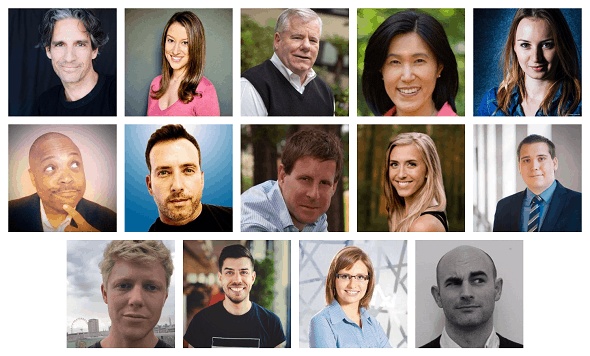
14 world class industry experts reveal 2018 HR trends

As 2017 is coming to an end, it’s time to look ahead and plan for the future. To give you a head start on the new year, we’ve gathered world-class industry experts to share 2018 HR trends which will rule the year to come.
HR trends: 2018 forecasts from 14 experts
We’ve asked Craig Fisher, Franz Gilbert, Dr. John Sullivan, Shannon Pritchett, Jim Stroud, Todd Raphael, Ben Slater, Elyse Mayer, Matthew Cooper, Mei Lu, Aleksandra Pszczoła, Nathan Perrott, Vince Szymczak, and Kate Kandefer about their recruitment trends forecast for 2018. Buckle up for seriously good insights from some of the sharpest minds in the industry!
 Craig Fisher leads marketing at Allegis Global Solutions and is the employer branding subject matter expert for their RPO business customers. He’s the author of Inbound Recruiting, and a popular keynote speaker at tech, social media, HR / recruiting, and sales conferences worldwide
Craig Fisher leads marketing at Allegis Global Solutions and is the employer branding subject matter expert for their RPO business customers. He’s the author of Inbound Recruiting, and a popular keynote speaker at tech, social media, HR / recruiting, and sales conferences worldwide
The most significant trend to impact recruitment in 2018 will be the rise of “newtraditional” workers. Nontraditional workers are a thing of the past. Everyone has a side-hustle these days. This is the new normal. With Millennials encompassing the majority of the workforce, we will see more regular work getting done by project-based workers. And we will augment the dwindling permanent workforce with automation technology where we have repetitive non-empathetic skills that can be replaced. Recruiters and employers must start thinking more closely about what projects need to get done and the expected business outcome of those projects. How can those goals be met by a mix of talent and technology and what will be your company’s redeeming offering to attract that proper mix for your newtraditional team?
 Franz Gilbert, GPHR, speaker and blogger @Franz Gilbert – HR Studies and HR Conferences
Franz Gilbert, GPHR, speaker and blogger @Franz Gilbert – HR Studies and HR Conferences
Without a doubt, the most significant recruitment in 2018 will be the continued rapid change in job skills and companies making dramatic shifts in their strategies – which requires companies to rapidly reskill or hire new skills into their organization. A great example in 2017 is looking at how many companies suddenly needed firmware programmers to support IoT projects.
 Dr. John Sullivan, Professor, Corporate Speaker and Advisor @Dr John Sullivan
Dr. John Sullivan, Professor, Corporate Speaker and Advisor @Dr John Sullivan
The most significant trend will be the sudden but exponentially growing demand for the integration of machine learning and AI talent into nearly every business process.
And with tech recruiting giants like Apple, Google, Tesla and Amazon targeting so many in this field and with so few being produced from top schools (it’s not something that is easy to learn on your own). I predict an unprecedented bidding war for the best in machine learning with experience. And when CEO’s at literally every other Fortune 500 firm also demand that their recruiting function hire a volume of them to move into business process improvement. Most recruiting functions (with their most active candidate capability) will simply be unable to compete. Recruiters will have to be specially trained to poach away this talent from the best firms.
I predict that this inevitable “War for AI talent” will be the largest and longest talent shortage of our lifetime.
 Shannon Pritchett, Editor @SourceCon
Shannon Pritchett, Editor @SourceCon
Automation and intelligence were arguably two of the most prominent buzzwords in talent and acquisition in 2017. Though the rise of robotics will still be trending into the new year, the most significant trend to impact recruitment in 2018 is marketing. Not merely marketing, but using marketing in combination with sourcing to better attract candidates.
Marketing is by no means the new shiny object. The concept of recruitment marketing has been around for some time. Next year, it will be imperative for organizations to have a valid and productive recruitment marketing strategy. Employment branding gurus have been on their soapbox for a while preaching on the benefits that marketing can bring to an organization. In 2018, these tactics will need to be fully functional and well executed.
With the rise of automation (this will be an actual implementation trend in 2019/2020), sourcers and recruiters are going to need to be able to find efficiently, attract, engage and nurture their candidates better than they ever have before.
Building a list of names and mass-messaging candidates are slowly becoming archaic in our industry. Many sourcing and automation tools have perfected web scrapping and lead generation. Sourcers and recruiters will need to learn the skills of a marketer to find better and attract talent. Talent attraction and the ability to better target a specific persona that matches your organization’s criteria are more efficient ways to help build relationships with candidates. Nurturing those relationships over time will be tremendously significant throughout the candidate’s journey.
Combining an effective marketing strategy with a productive sourcing stagey will also yield valuable marketing intelligence. The intel gathered will help organizations better predict and determine market trends and see insight into candidate trends and behaviors. Through marketing intelligence, sourcers and recruiters will be able to see more candidates, as well as their interactions with your brand and your competitors. This information will help sourcers and recruiters determine who to reach out to, and how and when to do it. Marketing intelligence will give recruiters and sourcers a more efficient and productive strategy before they begin their search. They will be able to identify candidates that are more likely to be a fit for your organization. Sourcers are the heart and soul of talent and acquisition and their performance will significantly increase with better marketing intelligence.

Jim Stroud, author, blogger, public speaker (and all around nice guy)
I think the most significant trend for 2018 will be robot process automation which is, automating repetitive tasks so humans can do what robots cannot. It is what has (and will) decrease the number of jobs in the coming year and create new jobs that many are not skilled for. It will spur companies to train their existing employees on new systems and processes; which will make them high value targets for competitors. People who do not adapt to the changing times and instead, continue to look for the same work they have always done, will be rudely awakened to the new era of robots in the workplace. And as such, they will be as frustrated as the employers seeking candidates with the skills they do not have.
 Todd Raphael, Editor in Chief @ERE Media
Todd Raphael, Editor in Chief @ERE Media
The biggest trend will be companies following the lead of Unilever and digitizing their hiring, making it quicker, more online, with fewer people involved, and fewer interviews with humans. Winners include some candidates who get a better idea where they’re at in the process, as well as technology vendors who provide online assessments and other tools to power these processes, and recruiting operations people who help find, select, and manage vendors.
I also think the new California law about salaries — not asking what people make, and requiring employers to give a range when asked — will have huge reverberations outside of the state, as multi-state employers will want to standardize their interviews.
Ben Slater, VP Growth @Beamery

Elyse Mayer, Director of Content at SmashFly Technologies
In 2018, I hope to see simplicity reign: simpler career sites, with streamlined UI and cleaner calls-to-action. Shorter applications with useful and necessary questions. Interviews that get to the heart and soul of a person, not that try to trick them. Employer brands and leadership communications that are authentic and real, not overdone and over-scripted and over-enthused. Let’s strip back what we put in front of the people we want to reach and influence so we can actually connect with them.
 Matthew Cooper, Growing Technology Leadership @Booking.com
Matthew Cooper, Growing Technology Leadership @Booking.com
There’s a lot going on in the world of recruitment currently, and I think it’s exciting times for the industry as a whole, but there’s a couple of areas I can see having a big impact in 2018. First is tooling. There are some really interesting products out on the market already or now being released, that have the potential to automate a lot of the upper funnel in all hiring processes. The development of AI tools coming from established players and start-ups alike have the potential to revolutionise the industry. However, contrary to a lot of the blogs I read online, I don’t think this is the death of the recruiter, instead I think that the recruiters who are quick to adopt this technology to help them do a lot of the heavy lifting will get a big advantage, as they will be freed up to spend more of their time on the human aspects of the process. This brings me to the second point. In such a competitive, international market for tech talent, the candidate experience has never been more valuable. Recruiting in Amsterdam, we’re not only facing competition from our neighbours in the Netherlands, but the whole world, so it’s key that you put the effort in to separate yourselves from your competition and really give your candidates the opportunity to experience life in your company.

Mei Lu, Founder and CEO @Geekology
The importance of diversity and inclusion has been in the spotlight more and more these days. In 2018, diversity recruiting will likely be a top recruiting priority for many organizations. This is especially important in technical recruiting, given the lack of diversity on technical teams historically.
There are different ways for companies to boost diversity recruiting results, including blind resume review, diversifying the interview panel, reaching out and partnering with schools or organizations with diversity focus, intentional diversity candidate pipeline building, closing compensation and promotion gaps, integrating diversity recruiting message with employer branding, and more. No matter what measures your company chooses, cultivating a culture that values diversity and inclusion and taking actions to demonstrate this value will be the most important drivers of diversity recruiting effort for any organization.
Aleksandra Pszczoła, CEO @Bee Talents
From employer branding perspective, it’s crucial to be aware of what people say on the web about our company. Our potential candidates should easily find relevant information such a company’s portfolio, recruitment process description or other employees’ opinion. On the other hand, from one year to another, HR is more and more data-driven. We can use many, amazing tools, that can be integrated with others. What’s awesome, they indicate our real problems which companies face on a daily basis, like for example, employee engagement or alignment with company’s vision. Based on such information HR can improve internal processes and strengthen company’s core values. In 2018, we have to be more candidate’s oriented and treat our employees like our best customers.
 Nathan Perrott, Helping employers tell their stories through digital marketing and technology @aiaworldwide & @TalentBrewTech
Nathan Perrott, Helping employers tell their stories through digital marketing and technology @aiaworldwide & @TalentBrewTech
The biggest recruitment trend I can see happening in 2018 is the continued adoption of technology to optimise conversions, improve the candidate experience and help recruiters be more effective. The challenge will be getting the right recruitment technology blend to meet the needs of the candidate, the recruiter and the business – no mean feat, certainly within traditional recruitment budgets. The quest for a single end-to-end recruitment / HR tech partner (attraction and sourcing right through to onboarding and beyond) will continue for most employers and will end in disappointment as they don’t find what they need, certainly in terms of quality combined with breadth of capability anyway. Those involved in choosing and buying tech will need to do thorough research, as there is a lot of promise out there when it comes to technologies such as AI, for example.
 Vince Szymczak, Director of Technology and Recruitment Strategies EMEA at Randstad Sourceright
Vince Szymczak, Director of Technology and Recruitment Strategies EMEA at Randstad Sourceright
2018 is the year when the early adopters will roll out chatbot solutions to help with interview scheduling and early phase screening efforts. In tech recruitment, the especially important aspect of this is to be able to progress on the schedule of the busy candidate, and not needing to wait for the availability of the recruiters.

Kate Kandefer, PhD, Partner & Head of Marketing @DevSkiller
When it comes to HR trends, I believe that personalization will rule 2018. As candidate-centrism is still going strong and will continue to grow in years to come, personalization will also be on the rise. It’s virtually impossible to show someone you’re genuinely interested in them without personalizing your message, so these two trends will surely go hand in hand.
Moreover, the focus of employers will be shifted from abstract knowledge to applied knowledge as practical skills and problem-solving are now more important than ever. Companies will continue to look for business problem solvers because they are the ones who provide value. In a fast-changing business environment, the ability to act immediately is no longer an option but a necessity.
Luckily, it’s now possible to single out people who not only have the right skills, but also the right mindset which fosters growth. Thanks to recruitment software, companies can now do that quite early in the recruitment process. The best way is to mirror work to be done if hired by asking candidates to solve problems that they will have to deal with on a daily basis in their future work.
What’s your prediction?
Our not-too-distant future holds a lot of opportunities, but there are also challenges to be faced. What are your predictions for 2018? Let us know in the comments section below!





